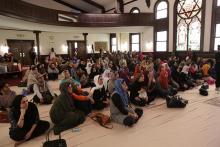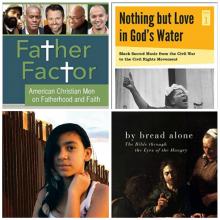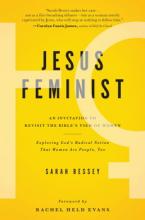Feminism

BY THIS TIME in the church calendar, the liturgical highlights feel like they’ve slowed considerably. The excitement of Easter is gone, not to be replaced by another holy season until Advent. Pastors and parishioners, who all stayed away the week after Easter, hopefully have returned. The holy days seem to have drained away into the season of counting the weeks, depressingly named as “ordinary time.”
Ecclesially speaking, however, the holy days are amping up considerably at this point. Easter season hits a crescendo with these latter weeks. The ascension of Christ used to be marked as one of the greatest feast days of the year, up there with Easter, Christmas, and Pentecost. It signifies Christ’s rule over all things, hidden now, to be full-blown and publicly obvious to all in God’s good time. Christ himself insists that he must go away in order that the Advocate would come and, in John’s language, to enable us to do even “greater works” than Jesus ever did. Pentecost is a new outpouring of the triune God to empower the church to do those greater works. There is much here to be celebrated. A crescendo, not a tapering off.
These texts present a reign inaugurated with resurrection in which the poor eat and are satisfied. One built on friendship and common love. It suggests a God who likes getting born enough that God decided to go through the experience and told the rest of us we should go through it all over again. Is that bodily enough for you?

Following complaints, the Vatican’s cultural office has removed an image of a naked female torso bound in ropes that was used to advertise a women’s conference.
The Pontifical Council for Culture had chosen a photograph of the 1936 “Venus Restored” sculpture, by the late American artist Man Ray, as befitting for its Feb. 4-7 conference titled “Women’s Cultures: Equality and Difference.”
But the choice of a sculpture bound in ropes to discuss women’s emancipation was deemed inappropriate in some quarters. The Pontifical Council’s president, Italian Cardinal Gianfranco Ravasi, initially defended the choice. Ravasi was seen as a contender going into the conclave that elected Pope Francis two years ago.
“Cardinal Ravasi has chosen not to remove the image as it speaks clearly for one of the central points of the document: many women, alas, are still struggling for freedom (bound with rope), their voices and intellect often unheard (headless), their actions unappreciated (limbless),” according to a statement that appeared alongside the controversial image.

THE DIALOGUES I am having with others in my late 30s are in contrast with the ones I had in my 20s when I was a single suburbanite. ... My aroused feminist perspective tempts me to say that traditional evangelical theology was adequate when I was living with a primarily masculine (in the Jungian sense) orientation to life, but has revealed deficiencies as I have related to life out of a more feminine consciousness.

Whether women can, or should, “have it all” — both work and family — has been one of the most contentious cultural debates of the modern age and one any secular or religious figure engages at his or her peril.
But Pope Francis is nothing if not intrepid, and on Feb. 7 he plunged in by arguing that the Catholic Church should help “guarantee the freedom of choice” for women to take up leading posts in the church and in public life while also maintaining their “irreplaceable role” as mothers at home.
In his remarks to the Vatican’s Council for Culture, which has been holding meetings on the role of women in modern life, Francis sought to carve out a “new paradigm” in the gender wars.
He said Western societies have left behind the old model of the “subordination” of women to men, though he said the “negative effects” of that tradition continue.
At the same time, he said, the world has moved beyond a model of “pure and simple parity, applied mechanically, of absolute equivalence” between men and women.

A downtown Los Angeles interfaith center that once served as a synagogue was the site of a historic worship service last week, as dozens of women gathered for Friday Muslim prayers in what is being dubbed the first women’s-only mosque in the United States.
M. Hasna Maznavi, founder and president of the Women’s Mosque of America, and co-president Sana Muttalib, said they are following the example of women pioneers at the forefront of Islamic education and spiritual practice.
“Women lack access to things men have, professional or religious,” said Muttalib, a lawyer. “I think this is our contribution to help resolve that issue.”
Maznavi, a filmmaker, said women-only spaces have been part of Islamic history for generations and still exist in China, Yemen and Syria. In the United States, nearly all mosques separate the sexes. Women pray in the rear of the prayer hall or in a separate room from male congregants.
About 100 women attended the jumah or Friday prayer on Jan. 30 in a rented space at the Pico Union Project, just a few minutes from the Staples Center.
Edina Lekovic, director of policy and programming at the Muslim Public Affairs Council, gave the sermon.

A Catholic priest who recently took charge of a San Francisco parish has said only boys can be altar servers, a move that is sparking both criticism and praise and comes amid a wider debate over conservative concerns that the Catholic Church has become too “feminized.”
ALL THE 14-YEAR-OLD BOYS kill their grandmothers.
I stole the line— “It was the day my grandmother exploded”—from Iain Banks’ novel The Crow Road.
I write it on the whiteboard on the first day of school, and ask my ninth graders to compose a short story starting with that prompt. The girls go for metaphor—their Nanas and Mee-Maws explode in frustration or laughter.
The boys go literal and explode their grandmothers into bone-chunks and guts. Usually I laugh. Not this year. I’m pregnant with a baby boy, and I’d prefer he never explode anything, especially the women who love him.
During the five years I’ve taught this lesson, meant to celebrate the punch of a great opening line, the Tsarnaev brothers blew up the Boston Marathon finish line, George Zimmerman killed Trayvon Martin, Adam Lanza devastated Newtown, Conn., by firing bullets into each of 20 small children and six adults, and Elliot Rodger carried out a misogyny-fueled killing spree in Isla Vista, Calif. I live in Texas, where gun-lovers and worried moms persist in a steady standoff about open carry laws.

The Buffalo Bills cheerleaders are advised by management on which type of feminine product they should use for their menstrual cycle. They are told that they cannot wear clips or tie backs in their hair. They have been asked to perform backflips on demand at an annual golf tournament where men placed bets on which Buffalo “Jill” would ride in his golf cart.
For all these imposed regulations and for hundreds of hours of work, members of the NFL Buffalo “Jills” Cheerleading Squad did not receive a penny of wages.
In April, five former Jills cheerleaders filed a lawsuit in the New York Supreme Court against the NFL franchise for "exploiting the women by failing to pay them in accordance with New York State minimum wage laws."
The worst part of this is: I don’t care.
When I was growing up I never wanted to be a cheerleader. I barely had a Barbie doll. I raced my brother’s Big Wheel on foot. I never had the desire to stand on the sidelines and cheer for other people, namely men, that were considered more athletic than myself.
So when I heard the news of the Jills’ unfair treatment, my personal sympathy level was somewhat low. They wanted to be cheerleaders, right? They signed up to wear short skirts and tight tops and dance in front of millions of people — they didn’t have to do that.
One commentator on the Jills’ lawsuit said, “Nobody forced them to be cheerleaders. They weren't enslaved. Stop with the pity party.”
And there lies the rub. What’s really at the root of these issues?

Paternal Insights
Father Factor: American Christian Men on Fatherhood and Faithoffers diverse perspectives from men under 40 who are rooted in a broad spectrum of Christian traditions, ethnicities, and backgrounds. Edited by R. Anderson Campbell, this is the fifth volume in the I Speak for Myself series. White Cloud Press
Sing Freedom
In Nothing but Love in God’s Water: Volume I, Black Sacred Music from the Civil War to the Civil Rights Movement, gospel music scholar Robert F. Darden explores the sustaining and revolutionary power of sacred song in African-American history. Penn State Press

In a perfect world, women can choose to be whomever they want. But there is not yet a country on earth in which that is actually true. That is why we need feminism.
That there’s disagreement over how we talk about women’s empowerment in the U.S. isn’t surprising — feminism is a collection of unique people with unique visions of a good life, trying to figure out how to preserve past and present good, correct past and present wrongs, and forge a new way ahead together.
But it is tragically, perennially clear why speaking up against male-controlled narratives in church or school or novels or movies or business or government, against generations of excused behavior for men and oppression for women, against ongoing systemic injustice is still so crucially necessary.
From reading what these “anti-modern-feminists” have written, I don’t believe any of them would take umbrage with that. It’s a pity, then, they are rejecting the term feminism — their challenges would be great additions to the dialogue. More education and conversation about what feminism is, and how we do it, and where it can go, is clearly needed. Without it, I’m not at all sure how much farther forward we’ll be able to go.

I have two daughters.
They are little spark plugs of utter joy and complete chaos. They make me laugh. They make me cry. They remind me to view the world through childlike wonder. They remind me that I am not what I do, but who I am. They teach me what selfless love actually looks like … every day … day after day … early morning after early morning … nasty crap diaper after nasty crap diaper. They make me realize how much I have to learn about parenting and our place in the world.
Most every night from the moment they were born, I have quietly held them in my arms or rested my hand on their backs while they sleep and prayed for them.
I pray for their continued breath. I pray for their development as little, unique human beings. I pray the Spirit of God to fill them and empower them. I pray the Lord’s Prayer over them. I pray for them to be protected from evil. I pray for them to love those who aren’t often loved. I pray for them to live confidently into who they have been created to be, free from the pressure of imposed reputation and expectation.
I pray for their past, present and future.
In learning to love these little girls, I began to ask more and more questions about the place of women in the world, in the church, and in everyday life.

If the new Disney Studios movie Maleficent is, as some are saying, a feminist attempt to redeem images of weak and powerless women in fairy tales, then it is a cautionary tale. Feminism has always been its own worst enemy when it strives to create women in the image of men rather than encourage women to abandon rivalry with men and seek their flourishing elsewhere. This is a story about the redemptive power of a mother’s love. I wonder how many feminists will embrace that message?


Christian men - males who are caught up in the ancient, raw, and radical Jesus movement, this is to you:
It's high time we say something, do something - good Christian men, stand up. Women are being raped and sexually abused across the world, and we continue to theologically shrug our shoulders. It's just the way it is, we say.
Whether we want to admit it or not, we turn a blind eye to the ways in which our holy scriptures have sanctioned this throughout history.

Earlier this week, feminist Gloria Steinem said that religion is the “biggest problem” facing feminism today.
Steinem made this assertion in response to a town-hall style question she was asked during an interview with Jennifer Aniston at the MAKERS Conference. The MAKERS Conference was born of the PBS documentary, “MAKERS: Women Who Make America,” and was held to develop an “action plan to define the agenda for women in the 21st century.”
Steinem was asked, “What do you think the biggest problem with feminism today is?” to which she replied, “What we don’t talk about enough is religion. I think that spirituality is one thing. But religion is just politics in the sky. I think we really have to talk about it. Because it gains power from silence.”

“The less engaged people are, the more they tend to criticize. The more engaged people are, they have far less time [and] energy with which to criticize.”
She might as well have completed the above statement with the dismissive wave I heard in her voice. But she didn’t.
She’s a pastor’s wife. Her bread and butter (and heart and soul) are wrapped up in the local church. I have been there. Perhaps the mile I walked in those shoes helps me understand the sentiment. And I think there is a place for tempering unjust criticism from sources that seem negatively biased. That protects people, sure.
But I can’t let it go at that.

Using a strong scriptural and historical foundation, self-described “happy-clappy Jesus lover” Sarah Bessey relates in her book, Jesus Feminist,how the church has responded “to the movement of the Spirit throughout the centuries, and [how] gender inequality is only one more example of justice seeking in progress.” Bessey tells of God’s redemptive love through the ages, and how women have served and are serving their homes, churches, communities, and the world at large to bring forth that love. The power of women coming together — or acting alone — for God is clear: Women, she writes, can move mountains, even if one stone at a time.
If a world devalues half its members, for every woman who moves a mountain, there will be another woman suffering. Bessey notes the disturbing fact that “Many of the seminal social issues of our time — poverty, lack of education, human trafficking, war and torture, domestic abuse — can track their way to our theology of, or beliefs about, women, which has its roots in what we believe about the nature, purposes, and character of God.” And with that sentence, conviction begins.
JAMES DOBSON and Kurt Bruner get three things right in their recent novels Fatherless and Childless: Euthanasia is wrong, married couples should make time to have hot sex, and stay-at-home moms should get some respect.
Pretty much everything else in the novels, the first two-thirds of a trilogy (book three, Godless, is due out in May 2014), is way off and internally incoherent. The plot starts in 2042, when an aging population and economic malaise have motivated the government to legalize euthanasia. Businessman Kevin Tolbert, recently elected to Congress, lectures his peers about the need to stop euthanasia and encourage parenthood in order to revive the economy. His wife Angie’s high school friend Julia Davidson, an allegedly progressive and feminist reporter, is assigned to write a story about him (lecture alert). Meanwhile Kevin and Angie struggle (with mercifully few lectures) with their third child’s diagnosis of Down syndrome. Subplots deal with a disabled teen and an elderly dementia victim who turn (or are pushed) to euthanasia.
Actual euthanasia, as disability-rights groups such as Not Dead Yet have documented, often turns on society defining “dignity” according to physical ability and health instead of the innate value of a human being. These novels, however, ask us to believe the main impetus for euthanasia would come from the drive to reduce the federal deficit, to deal with “swelling entitlement spending.”
What spending? The novels’ elderly and disabled characters are drawn or pushed toward euthanasia because of family financial troubles: There is no mention of any Social Security, Medicare, or Medicaid help going to any of them.

Ever since the most recent MTV Video Music Awards aired, there has been a breathless competition online to see who can be more offended by Miley Cyrus’ highly sexualized performance. Yes, I watched it, and yes, much of it made me pretty uncomfortable. It was hard for me not to imagine my own daughter a dozen or so years from now, longing to replicate the gyrations and sexual gestures of another – but similarly overt – pop idol.
Basically, it was lowest-common-denominator entertainment: hardly anything new in the music industry. Madonna did as much and then some decades ago, so why is this particular incident such a big deal?
For one thing, one of the most lurid moments of the performance had her grinding in a compromising position with a married man nearly twice her age. Interesting, though, that the criticisms of Miley online have far outweighed those of Robin Thicke, the married man in question who participated in said grinding. Suffice it to say that women historically have been held to different standards of sexual expression than men, and when in doubt, blame the woman. Not that her dance was appropriate, but it tells us more about ourselves when we obsess about the shenanigans of the young woman than the borderline adulterous displays of a much older man.